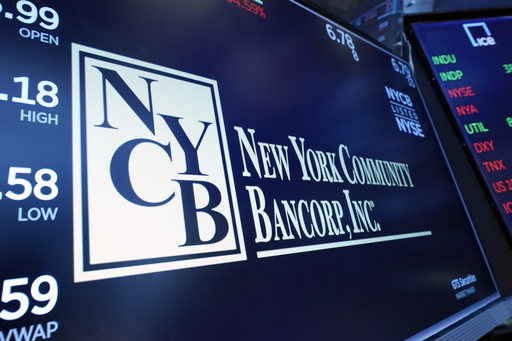NEW YORK (AP) — Embattled New York Community Bancorp announced a lifeline of more than $1 billion from a group of investors on Wednesday, after seeing its stock plunge by more than 80% this year.
The announcement sent shares of the bank, which has been hammered by weakness in commercial real estate and growing pains resulting from its buyout of a distressed bank, on a wild ride. After nearly halving early in the day, the stock surged nearly 30% after the announcement, only to give it all up and then swivel before ending with a gain of 7.5%.
The deal will bring four new directors to NYCB’s board, including Steven Mnuchin, who served as U.S. Treasury secretary under President Donald Trump. Joseph Otting, a former comptroller of the currency, will become the bank’s CEO.
Under the deal, which the bank said still needs “finalization of definitive documentation” and regulatory approvals, NYCB would get investments of $450 million from Mnuchin’s Liberty Strategic Capital, $250 million from Hudson Bay Capital and $200 million from Reverence Capital Partners. Cash from other institutional investors and some of the bank’s management will take the total over $1 billion, the bank said.
The investors will receive stock in the company valued at $2 per share, along with convertible preferred stock that could pay dividends every three months.
The bank’s stock had tumbled 42% to $1.86 earlier Wednesday, before its trading was halted in the afternoon, pending news. A report from The Wall Street Journal earlier in the day had said the lender was considering raising cash through the sale of stock in order to shore up confidence in it.
After the announcement of the $1 billion infusion, NYCB’s stock immediately erased those losses and surged toward its best day in nearly a year. But the stock almost as quickly gave up all the gains before climbing into the close. It ended the day at $3.46.
Stocks of other regional banks, which have been caught up in nervousness around NYCB, also wobbled. An index of regional bank stocks went from a loss of 3.1% before the announcement to a slight gain and back to a loss of 0.4%.
NYCB was a relatively unknown bank until last year, when it bought the assets of Signature Bank at auction on March 19 for $2.7 billion. Signature was one of the banks that crumbled in last year’s mini-crisis for the industry, where a bank run also sped the collapse of Silicon Valley Bank.
The sudden increase in size for NYCB meant it had to face increased regulatory scrutiny. That’s been one of the challenges for the bank, which is trying to reassure depositors and investors that it can digest the purchase of Signature Bank while dealing with a struggling real-estate portfolio. Losses in loans tied to commercial real estate forced it to report a surprise loss for its latest quarter, which raised investors’ concern about the bank.
NYCB, which is based in Hicksville, New York, said last week that it had found significant weakness in how it internally reviews loans, caused by ineffective oversight, risk assessment and monitoring activities. That caused it to delay filing its annual report, and it reshuffled its top management.
Pressure rose further on the bank after credit agencies cut their NYCB ratings.
Industry analysts still say NYCB’s troubles appear relatively unique to the bank and downplayed the risk of contagion in the banking sector.
“It’s very interesting that they ended up being an amalgamation of a few bank acquisitions that seems to just not worked out,” said Chris Caulfield, a banking industry consultant and analyst with West Monroe, who focuses on mid-sized banks.
But weakness in commercial real estate is a looming challenge for all kinds of banks, as changes in how people work following the pandemic leave many office buildings with more vacancies.
___
AP Business Writer Ken Sweet contributed.
Home Politics Live Politics Embattled New York Community Bancorp gets $1 billion cash infusion, adds Steven...
